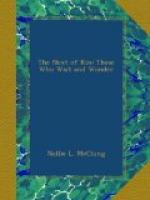Just now partyism is falling into disfavor, for there are too many serious questions to be fought out. There are still a few people who would rather lose the war than have their party defeated, but not many. “When the Empire is in danger is no time to think of men,” appeals to the average thinking man and woman. The independent man who carefully thinks out issues for himself, and who is not led away by election cries, is the factor who has held things steady in the past. Now it seems that this independent body will be increased by the new voters, and if so, they will hold in their hands the balance of power in any province, and really become a terror to evil-doers as well as a praise to those who do well!
Old things are passing away, and those who have eyes to see it know that all things are becoming new. The political ideals of the far-off, easy days of peace will not do for these new and searching times. Political ideals have been different from any other. Men who would not rob a bank or sandbag a traveler, and who are quite punctilious about paying their butcher and their baker, have been known to rob the country quite freely and even hilariously, doctoring an expense sheet, overcharging for any service rendered. “Good old country,” they have seemed to say, “if I do not rob you, some one else will!”
This easy conscience regarding the treasury of the country is early shown in the attitude toward road-work, those few days’ labor which the municipality requires men to do as part payment of their taxes. Who has not noticed the languorous ease of the lotus-eating road-workers as they sit on their plough-handles and watch the slow afternoon roll by?
Politics too long has been a mystical word which has brought visions of a dark but fascinating realm of romantic intrigue, sharp deals, good-natured tricks, and lucky strikes. The greatest asset a politician can have is the ability to “put it over” and “get something for us.” The attitude of the average voter has been that of expectancy. If he renders a public service, he expects to be remunerated. His relation to his country has not been, “What can I do?” but, “What can I get?” His hand has been outstretched palm upward! Citizenship to us has not meant much; it has come too easy, like money to the rich man’s son! All things have been ours by inheritance—free speech, freedom of religion, responsible government. Somebody fought for these things, but it was a long time ago, and only in a vague way are we grateful! These things become valuable only when threatened.
There hangs on the wall, in one of the missions in the city of Winnipeg, a picture of a street in one of the Polish villages. In it the people are huddled together, cowering with fear. The priest, holding aloft the sacred crucifix, stands in front of them, while down the street come the galloping Cossacks with rifles and bayonets. Polish men and women have cried bitter tears before that picture.




